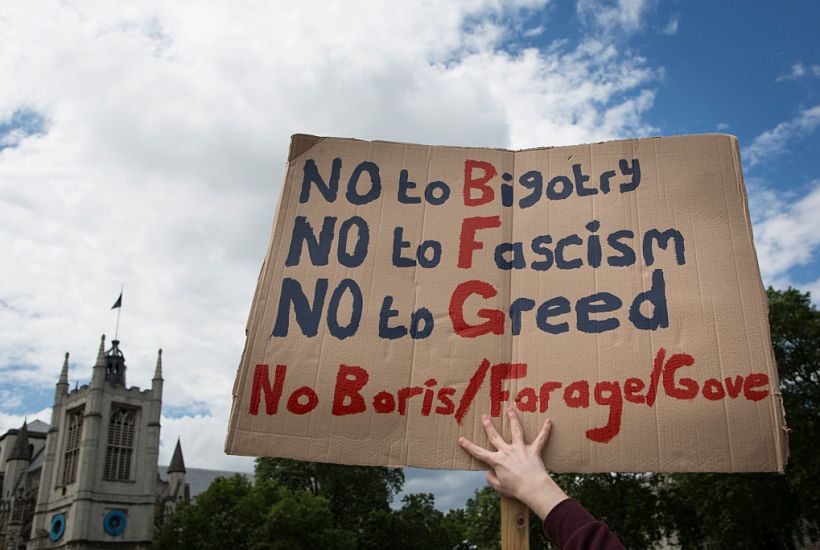After appearing on Newsnight last week, an #FBPE-monikered keyboard warrior wrote a much liked comment above my picture that read:
“Bat shit crazy, howling at the moon @brexitparty_uk neo Nazi fascist apologist tries to blame the judiciary. Straight out of the Hitler/Goebbels Handbook. We are living in dangerous times. #stopbrexit #RevokeA50 #SaveDemocracy”.
This was one of the more polite responses. We all know that the internet has become somewhat unhinged and I get a daily dose of such unrestrained invective. But it is a shock when such attitudes spill over into face-to-face encounters.
When I spoke at a debate on Brexit at a festival in Highgate last weekend, a seemingly polite and civilised affair, fellow panelist Labour MP Owen Smith compared my views – in front of a live audience – to those of Enoch Powell: “we could have heard so many of the things that Claire said today from his lips in an earlier era. If she doesn’t want to recognise that, I’m going to tell her she should recognise that because they are precisely the sorts of speeches that we heard from successive generations of right-wing politicians…her political views are dangerous – dangerous for our interests as a country and dangerous for our interests as citizens and human beings in our country and elsewhere”.
As a lifelong anti-racist and anti-fascist, I was incandescent, but I was also aware of what those in the crowd would think of me. If I was a fascist, they’d be entitled to reject normal, reasoned discourse with me. If they believed the accusation, legitimate anti-fascist instincts might kick in – would I deserve a kicking?
In my lifetime, I’ve had my fair share of fighting actual fascists (and being on the receiving end of boots and fists of racist thugs). I know that if people really do believe that a demand for democratic control over borders is interchangeable with closing those borders and racist deportations, then people might over-react. If people believe that Brexiteers are Nazis, and are a physical threat to immigrants, then they might become legitimate targets for progressive anti-racists. As I would soon discover.
Returning home to my flat in Haringey recently, after a long trip back from Strasbourg, I was approached by a self-proclaimed Corbyn supporter I’ve never met, who screamed a torrent of abuse at me. “Fascist scum…you should be driven off the estate”. He kept on and on, screaming at the top of his voice, that I was a racist. (Just in case of any doubt – I’m not). He was on a bike, it was late at night in the dark and he cycled directly at me twice, to ensure his message was delivered close-up and personal. Eventually he cycled off yelling my name and inviting neighbours to get me kicked out of my house. I admit I was shaken and scared, but also frustrated and indignant at being accused of holding the type of political ideas I have spent a lifetime opposing.
This kind of thing happens a lot these days. On a Brexit party street stall in Liverpool, a group of three Labour party members verbally attacked me for talking to a young black Remain-voting student, who had stopped to talk. The ‘activists’ shouted obscenities at him demanding that he shouldn’t engage with “Nazi filth”. Ironically our stall was manned by two non-white supporters of the Brexit party. But even so, they demanded that I leave the city “or else”.
It is difficult to relate such anecdotes (and there are many more) without sounding as though I am playing a competitive ‘my insults and physical threats are worse than yours’ game. But I am afraid that when it becomes routine to use the label Nazi/fascist as way of delegitimising the views of Leave voters, this can encourage opponents to take aim – quite literally – at Brexiteers, as the enemy within.
Once such delegitimisation becomes normalised, this can make those who wear their anti-fascist credentials on their sleeve, cavalier and tone-deaf when it comes to spotting hypocrisy about who should be defended from hateful abuse.
I was genuinely shocked when Matt, a tweeter who uses #HopeNotHate in his Twitter handle, seemed to think it was amusing to retweet a message about me from a known far-right activist. This documented the time and place of a public meeting I was speaking at in my NW constituency and was addressed to a local Loyalist group.
Matt thought it was a funny in-joke for his followers because “These are after all the sort of people that elected you” (we’re all far-right – get it?) and the threats were subsequently shared by anti-Brexit obsessive Otto English.
How kind of these social justice warriors to publicise a menacing thread about me. But you can see their logic. For those who self-righteously denounce Brexiteers as indistinguishable from fascist thugs, it’s apparently harmless fun to write comments such as “don’t want the scruffy republican c**t anywhere near Burnley” and “Fcuk ing scume slag horrible person she is not wanted so fcuk back home” (sic).
No doubt my well-documented support for Irish Freedom many decades ago, didn’t help (even though these were views held before the Good Friday Agreement). But it is as a high-profile and elected Leave campaigner that I am apparently not worth defending. Matt, a campaigner against ‘hate’, was smugly unconcerned. Some who campaign against hate, seem to hate the Brexit party more than they love peace.
What is to be done? Well, I would urge all sides to refrain from conducting political debate – however passionate or angry – in terms that demonise opponents.
While I have privileged access to public forums to counter the many attempts at maligning my motives and character, the majority of ordinary voters are forced to look on aghast as they are reduced to an inanimate blob, merrily traduced through some unpleasant labels.
One of the most disconcerting aspects of the type of insults hurled at Leave voters over the last three years is how we are frequently referred to in dehumanised terms: as Brexit bots (i.e. not people at all but automated algorithms), ‘gammon’ (i.e. pieces of meat) Neanderthal knuckle-draggers, of being Brextards (i.e. a Brexit retard, apparently).
It is worth remembering that the tactic of depriving people of their basic humanity and agency is exactly what is so reprehensible about racial thinking historically. Ironic, isn’t it? So-called anti-Brexit anti-racists are creating a moral distance between those who they proclaim to be righteous and those stereotyped as inferior creatures. They are legitimising the perception of other types of people as less than human.
Despite all this, I am not calling for a ban on dehumanising, rude, or accusatory language, however repulsive. And I won’t be calling for David Lammy to be arrested for suggesting that his fellow MPs in the ERG are worse than Nazis, nor Jess Phillips for wanting to knife Corbyn in the front. I am fully aware that one of the dangers lurking around the debate on inflammatory language is the normalising of demands for censorship. We are in the midst of a newly-invigorated “You can’t say that” mood. Despite threats against me and others, I believe we should hold our nerve. Democrats need to value free speech and we should not be intimidated into giving an inch of it away.
Today’s tone policing also threatens to sanitise political debate, reducing it to an anodyne set of acceptable, technocratic, cliched soundbites. We mustn’t let that happen. The recent bout of over-literalism means any metaphor can now be taken as a literal threat. As Iain Macwhirter wryly notes: “If all military metaphors are an incitement to violence, Sir John Curtice is going to be had up for calling the next election “campaign” a “battleground” with “air war/ground war” and “decapitation strategy”.
There is no doubt how unpleasant the language can be in the Brexit debate, but somehow we need to work our way through this and retain the ability to use the richness of language to describe the world we live in and express political viewpoints.
Is it different when words are said to incite violence? Led by MP Paula Sherriff, some female Labour MPs have linked Boris Johnson’s heated language in debates about Brexit to death threats, even raising the tragic murder of Jo Cox as a warning, suggesting that if the rhetoric isn’t toned down, others might die too.
This can only lead to less open debate, and is an increasingly popular tactic. At the weekend, anti-Brexit campaigner Femi Oluwole suggested MP Iain Duncan Smith would be culpable in future homicides because IDS dared to call ‘those of us trying to stop Brexit “Extremists”’. Never one to unwittingly double-down, Femi said: ‘When the next political murder happens in this country because you’ve dog-whistled that remainers are a security threat…. I hope you’re happy’. So now calling someone an “extremist” is tantamount to incitement?
Even if Femi wants to close-down debate by controlling an MP’s language, we shouldn’t respond in a tit-for-tat way. Femi too should be free to utter irresponsible accusations and we all should be free to hear him and judge him accordingly.
However, Femi’s dog-whistle reference particularly needs to be challenged. Viewers and voters are not unthinking attack dogs who only have to hear certain words or phrases to be triggered to political savagery. This further dehumanises our fellow citizens as a volatile mob. We are, they say, just one utterance of ‘surrender’ or ‘traitor’ away from being whipped up into a dangerous rabble. This is the worst insult of all. And using it as an excuse for clamping down on free speech is far more of a threat than any inflammatory language.
So, you have my permission: carry on insulting me and my fellow Brexiteers. It is an ugly, necessary reality, but it is preferable to censorship.
Also, let’s have faith in our peers to hear the worst incitements and decide for themselves how – or if – to respond, and not assume the worst of people.
As a post-script, the Burnley MEPs’ event was a huge success. It was a stimulating, high-quality, energised political debate that passed off without incident. A couple of likely lads did turn up, looking disappointed to find us all engaged in civilised and lively discussion, and skulked off before the end. Reason will out; democracy and free speech are our best weapons to defend ourselves.
Got something to add? Join the discussion and comment below.
Get 10 issues for just $10
Subscribe to The Spectator Australia today for the next 10 magazine issues, plus full online access, for just $10.




















Comments
Don't miss out
Join the conversation with other Spectator Australia readers. Subscribe to leave a comment.
SUBSCRIBEAlready a subscriber? Log in